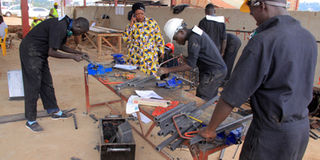Put entrepreneurial skills to gainful use

Skills as such are meant to develop job creators rather than job seekers.
Uganda has a gross mismatch between the number of graduates and available jobs. As of May 2019, the Uganda Bureau Of Statistics (Ubos) indicates that Uganda’s unemployment rate stood at nine per cent for the working age population.
However, for a country with one of the youngest populations in the world, unemployment for youths stands at 13 per cent for the 16 million youths in the country.
It is, therefore, imperative that students develop business skills at a much younger age to survive future unemployment.
Half a century ago, a young man dropped out of Senior Four at Mbarara High School after earning his first profits from Matooke business. The profits motivated him to continue with business.
Five decades later, with grit and determination, the young man horned his entrepreneurial skills and is currently one of the wealthiest men in Uganda creating numerous jobs for other people.
This is a story Gordon Wavamunno has shared with the media and at speeches several times.
Whereas Wavamunno might not have received any mentorship while at school to become a successful business man, the rules are changing with a new breed of young entrepreneurs being mentored and developed right from the start at secondary school level.
This is meant to develop job creators rather than job seekers. Projects such as the Stanbic National Schools Championships are doing this well.
The championship with more than 100 schools involved aims at encouraging students to explore their environment and come up with unique ideas for products, services and models that serve the needs of their community. Mentors both in the school and from the bank help students to develop ideas into social enterprises and community projects.
Japheth Katto, Stanbic Bank’s board chairman says education remains a key sector to support.
“Uganda has more than 3,000 secondary schools, and about 1.5 million students at secondary level. All these students are expected to go to university, graduate and get jobs in the market with limited job opportunities available,” he says.
When the programme was started, the idea was to enhance creativity, give financial life skills and build capacity among youth to create these opportunities.
And in the fifth year, the results are starting to manifest.
Success stories
Dorcus Kiconco, a first year Mass Communication student at Uganda Christian University (UCU) joined the championships in 2018 as a candidate in Senior Six at Bweranyangi Girls School in Bushenyi District. A business idea of a salon for students with natural hair pushed her group to become western region champions. The idea turned into a business which has been operational for the last two years in the school and is now valued at Shs 5million.
“We realised there wasn’t a saloon to cater for A-Level girls with natural hair and decided to start one. There was a need to fill the gap. But the business has since expanded to offer barbering services for the lower classes,” she says.
Lessons
Developing and turning the business idea into action has offered many business lessons to Kiconco.
“As an entrepreneur being confident and communicating well is what will sell the product. If you cannot describe what you are selling, then they won’t trust you enough to invest or buy it. In terms of finance, it has taught me skilling and confidence as well as saving,” she explains.
Betty Nalumansi, a teacher and an entrepreneur at Kitante Hill Secondary School says her school has participated since 2016.
“This programme is helpful to students because everyone needs a daily income at some point. It is a great opportunity for students not to be a burden to their parents. As a school, we need an all-round student,” she says.
Last year, Nalumansi says the school recycled bottles to make wallets and chalk holders. And that in the next competition, they are looking at alternative ways to win.
She says, “Whether we win or not, it has helped to mentor students. Some of them drop out of school before graduation and everyone needs money regardless of where we live. Students have different backgrounds, so if you equip them with skills regardless of whether they are wealthy or not, at the end of the day, they will find their place in society.”
Abdul Martini, a student studying entrepreneurship at Kitante Hill School opines that the championship is beyond just doing business and provides life skills such as communication skills for one to thrive in the job market.
About the championships
The competition is a nine months championship involving 100 secondary schools. These undergo a number of vetting stages such as the classroom test and the business idea generation stage.




